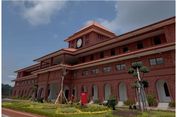Like Mubarak, Soeharto Bought Stability through Repression
WASHINGTON, KOMPAS.com - Senior White House officials are studying scores of global revolutions and political transitions for trends that might help Egypt plot an orderly and permanent shift to democratic rule.
A senior official told AFP that President Barack Obama’s foreign policy braintrust had surveyed transitions in Asia, Europe and South America, as it assesses Egypt’s future after the sudden fall of President Hosni Mubarak.
The search for historical precedent comes as some US commentators fearfully handicap the odds of the Muslim Brotherhood staging a takeover in Egypt and use Iran’s Islamic Republic as an omen. But officials and analysts say that power transfers in places as diverse as Indonesia, Chile and South Korea may be more apt, as Egypt’s military mulls a new power paradigm.
“Every country is unique, and one analogy can be dangerous,” said Michael McFaul, National Security Council director for Russia and Eurasian Affairs, who, in academic life, was an expert on democratic political transitions.
With that said, McFaul said that a historical overview of past political transitions could provide context for Egypt’s challenge. Officials have studied how nations edge away from autocratic rule and navigate a crucial interim period of establishing democratic constitutions, elections and institutions. Their conclusions have clearly informed US rhetoric on the need for an orderly and “irreversible” transition in Egypt.
A bulging six-inch-high binder currently sits on the West Wing desk of Tom Donilon, who commissioned the review, and has Obama’s ear on foreign policy as his National Security Advisor. But with uncertainty reigning in Egypt, it remains unclear whether the military will stomach the kind of democratic evolution much of the rest of the world wants to see.
And is it stretching a point to suggest that Egypt’s social networked, youth-driven revolt, laced with 30 years of thwarted aspirations under Mubarak, will absorb advice from abroad or absorb lessons of the past? Thomas Carothers, of the Carnegie Endowment for International Peace, said it was valid to seek lessons from history “as long as we assume that Egypt is not going to be Indonesia, is not going to be Iran.”
Indonesia though is a particularly appealing example for Washington as a Muslim-majority nation which embraced democracy after ousting dictator General Soeharto — who like Mubarak bought stability through repression. Obama, who bonded with Indonesia in four years there as a boy, views the emerging Asian giant as a political model after it turned from the “rule of an iron fist to the rule of the people.”
In Jakarta in November, Obama praised Indonesia’s elected presidency and legislature, checks and balances and dynamic civil society — a framework Washington would love to see Egypt emulate. But the world’s largest Muslim majority democracy is not the sole model.
“The cases that I think are most useful are in the late 1980s — in the Philippines, South Korea and Chile,” a senior official said.
In the Philippines, a civilian-military revolt overturned dictator Ferdinand Marcos and begat a corruption-tainted but enduring democracy. US-backed Chilean strongman Augusto Pinochet was forced by popular will to hold a 1988 referendum which led to a constitutional and electoral process.
And in US ally South Korea, pro-democracy protests jolted a military authoritarian regime to begin to transition to direct elections. US officials also looked at Poland’s transition from communist rule under charismatic Lech Walesa and the Czech Republic’s emergence under Vaclav Havel after the demise of the Warsaw Pact.
They caution that the march from dictatorship to genuine democracy is fraught, technical and not assured. Transitions that embrace all sectors of opinion have the best chance of success.
For Egypt, that would likely mean the military, civil society, opposition parties and grass roots protesters concurring on the way forward. “The key thing is that some group doesn’t feel disenfranchised by the process. You do that and you get spoilers,” a senior official said.
History shows Egypt would also be wise to “limit the agenda of change” the official said — adding that to try to do too much at once could lead to a fracturing of vital consensus. Egypt lacks the key ingredient of some popular revolts — a charismatic figure embodying hunger for change — as the Philippines had in Corazon Aquino.
But Carothers pointed out that while a rallying figure could provide “useful socio-political glue” the Chilean reform movement lacked an anti-government focal point but still succeeded.
Simak breaking news dan berita pilihan kami langsung di ponselmu. Pilih saluran andalanmu akses berita Kompas.com WhatsApp Channel : https://www.whatsapp.com/channel/0029VaFPbedBPzjZrk13HO3D. Pastikan kamu sudah install aplikasi WhatsApp ya.

































